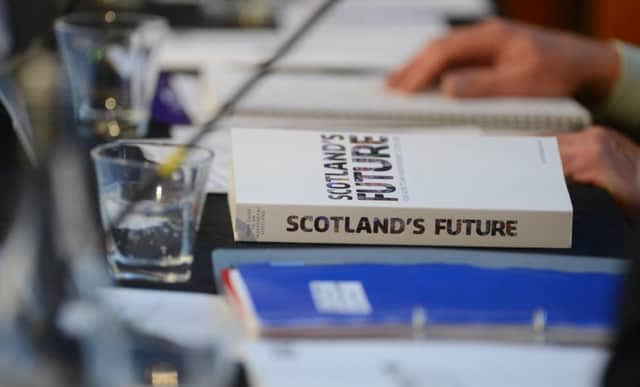Analysis: Benefiting the UK is most logical option


Mark Carney’s account of the advantages and challenges of a monetary union was clear and dispassionate, but technical economic assessment can only take us so far. In the end it is for politicians and the electorate to decide the final shape of any actual agreement. My views are based on economic principles and observation of monetary unions elsewhere. They are about what is technically possible and identifying a clearly workable and preferable option.
The Governor’s speech revisited issues that we discussed in the Scottish Fiscal Commission Working Group in our report on a workable Scottish macroeconomic framework.
Advertisement
Hide AdAdvertisement
Hide AdWe emphasised the importance of clear governance arrangements, a framework for financial stability and a consistent regulatory structure. We set out recommendations and propositions that we collectively believe provide for a workable monetary union.
SOME continue to believe that the Euro Area has shown that monetary union does not work. Mr Carney reminded us of the advantages of such a union, reducing transaction costs and exchange-rate risk, encouraging trade, competition and economic efficiency. Surely it is better for the English to be able to use their money in Scotland without paying to change it? That is not a trivial benefit. Nor is the absence of exchange risk, which otherwise has to be added to investment risk.
But countries in a union may not respond well to a crisis. Some responses, for example devaluation or monetary expansion are unavailable to them. The Euro Area has suffered from this and some members have found adjustment very difficult.
It can be argued that because of the wide differences among members some countries were not suitable for membership of the Euro Area. In contrast Scotland and the rest of the UK are very similar economies. Though there are some risks of asymmetric shocks, institutions can be built to adjust to them; and the costs are small relative to the advantages mentioned.
We set out clear recommendations, based on the balance of evidence, to ensure the macroeconomic framework was robust and sustainable reflecting the types of challenges and experiences that have been faced by some parts of the Euro Area.
The need for partners in a monetary union to share some sovereignty in common institutions is no disadvantage if monetary policy is then well conceived. Even if Scotland were instead to follow Hong Kong’s example and have a Scottish pound which a Scottish currency board keeps at parity with sterling, the interest rate would essentially be imposed on Scotland by world markets. Hong Kong exercises considerable autonomy in its fiscal and macro-economic policies. Scotland could expect to be able to enjoy comparable or greater autonomy.
THERE also must be credible fiscal projections for net debt and borrowing to meet market requirements and agreement on an overall fiscal base for a Sterling area. This would still allow for flexibilities in the design of the underlying tax system and a range of specific policies tailored for each country. This would provide the autonomy and policy levers to target country specific differences.
My commission colleagues and I also pointed out that a monetary union must have mechanisms that can respond in the event of an economic change to only one part of the currency union. The more integrated and similar the economies are the less likely that it is. The risk is mitigated to some extent by the degree of synchronicity between the members. It is nevertheless important to prepare for all eventualities. One way of doing that is to have a Stabilisation Fund, which we recommend – but there are a number of other options.
Advertisement
Hide AdAdvertisement
Hide AdPolitical debate will take place on the issue of a currency union. Technical discussions will continue. A continuation of sterling in its present area, which would be a benefit for all parts of the UK, is surely the most logical option. Politics may cloud that view as the referendum approaches.
• Sir James Mirrlees is professor emeritus of political economy at the University of Cambridge and professor at large at the Chinese University of Hong Kong. He won a Nobel Prize for economics in 1996.